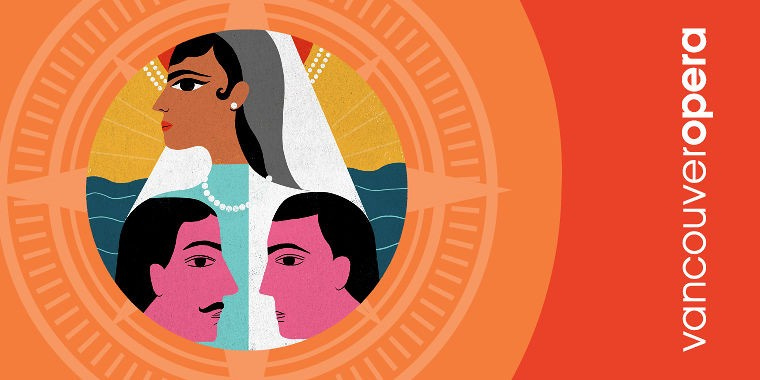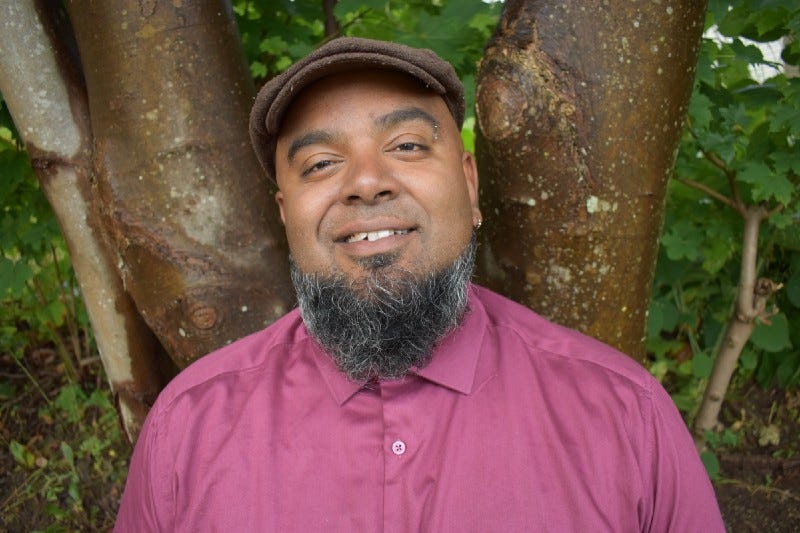An essay by Ajay Parasram
Vancouver Opera is bringing back The Pearl Fishers to the stage for the first time in 30 years. As part of our work in exploring and explicating the opera, we have commissioned some thinkers, creators, artists and composers to explore their responses to the opera.

The Pearl Fishers is right about one thing: people have been fishing for pearls in South Asia for millennia. Sri Lanka was an important hub of global relations for thousands of years. The seafaring prowess of Malay sailors connected continental Asia, South Asia, and Africa. In the time of the Mauryan emperor, Ashoka the Great (c. 250 BCE), the kingdoms on the island of Lanka were treated with great respect. According to the Mahavamsa — an influential 5th century CE chronicle of Lankan history — Emperor Ashoka sent his first-born son Mahinda as emissary to Lanka to broker a period of Buddhist internationalism. Far from drunken beach hangouts as the libretto describes, kingship in Lanka and much of South/Southeast Asia involved a delicate balance of cosmological and geopolitical priorities that required the fulfillment of both material and spiritual obligations. This practice and scholarship contributes to global political theory thousands of years before similar ideas would be explored by Europeans. Culture was always dynamic, and Lankan kings had a practice of marrying into royal families based in the Indian subcontinent. This tradition was still practiced nearly two thousand years later, when Europeans were discovered floating off the coast of the island in the early 16th century. The arrival of the Portuguese (who named the island “Ceylon”), and the Dutch and British who came in their wake, was not a “discovery” at all, but merely the arrival of Europeans into thousands of years of political and cultural development of the island.
Following Sri Lankan historian Nira Wickramasinghe, we know that living, vibrant, global culture has always been a defining aspect of Lanka. The dress of the Kandyan court in the island’s interior for example, takes influence from southern India and local traditions. Portuguese Catholics took refuge in the halls of Buddhist kings fleeing the wrath of Dutch protestants, and were offered space in temples to preach their gospel. As Sri Lankan anthropologist Gananath Obeyesekere’s work makes clear, the Kandyan king Vimaladharmasurya was baptized and raised by Catholic missionaries before being consecrated as the bodhisattva king. If that sounds contradictory, it’s because of how thoroughly society has been trained to understand European assumptions about the world as being normal and universal, while others are understood as being regional.
As a contemporary audience we need to question to what extent classics like The Pearl Fishers can approximate universal human experience.
The French creators knew nothing about Sri Lankan history, culture, and world views. A dozen years before the Opera was composed, anti-colonial rebellion was terrifying the British and it centred the very Temple (and the sacred tooth relic the British governor failed to take seriously) referenced in the libretto. The French creators were not expected to know anything about “Ceylon” because the society in which they created was one that claimed expertise over the world without respecting global culture and cosmologies. Indeed, The Pearl Fishers was originally meant to take place in Mexico and switched to “Ceylon” for political reasons related to Napoleon III’s adventures in Mexico in the 1860s. What’s the difference between one brown beach and another, I suppose? Bizet, Cormon, Carrè and others believed that they were telling universal stories about friendship, love, and torment, but as a contemporary audience we need to question to what extent classics like The Pearl Fishers can approximate universal human experience. Far more likely is that it offers a uni-versal one, where white Frenchmen dress up Christian assumptions about divinity with superficial references to “Brahma” or “Buddha,” without any interest or obligation to understand the differences between South Asian cosmology as something fundamentally different from European cosmology.
In setting The Pearl Fishers on an ancient “arid and wild beach” peopled by “drunken Indians” who seem to randomly appoint kings based on the whims of the moment, we are left to believe that ancient Lanka is a pre-historic place with a weirdly confused mash-up of Hindu, Buddhist, and occasionally Islamic frames of reference. As the great scholar of Orientalism, Edward Said reminds us, the power to represent the “Other” through history, culture, and expertise has real consequences, and tells us more about how Europeans saw themselves than it ever could about Sri Lanka.
Ajay Parasram, is an Associate professor in the departments of International Development Studies and History, Dalhousie University, Kjipuktuk (Halifax). He is the author of a forthcoming book entitled Imperial Encounters in Sri Lanka: Pluriversal Sovereignty and the State (Manchester University Press, 2023) and the co-author (with Alex Khasnabish) of Frequently Asked White Questions (Fernwood Publishing, 2022).
Tickets and information to The Pearl Fishers, October 22–30 at the Queen Elizabeth Theatre, are available at VancouverOpera.ca





